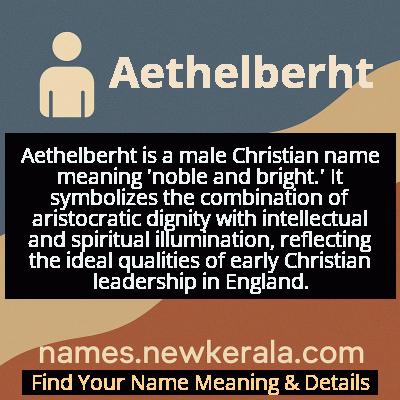Aethelberht Name Meaning & Details
Origin, Popularity, Numerology Analysis & Name Meaning of Aethelberht
Discover the origin, meaning, and cultural significance of the name AETHELBERHT. Delve into its historical roots and explore the lasting impact it has had on communities and traditions.
Name
Aethelberht
Gender
Male
Origin
Christian
Lucky Number
5
Meaning of the Name - Aethelberht
Aethelberht is a male Christian name meaning 'noble and bright.' It symbolizes the combination of aristocratic dignity with intellectual and spiritual illumination, reflecting the ideal qualities of early Christian leadership in England.
Aethelberht - Complete Numerology Analysis
Your Numerology Number
Based on Pythagorean Numerology System
Ruling Planet
Mercury
Positive Nature
Adventurous, dynamic, curious, and social.
Negative Traits
Restless, impatient, inconsistent, prone to indulgence.
Lucky Colours
Green, white.
Lucky Days
Wednesday.
Lucky Stones
Emerald.
Harmony Numbers
1, 3, 9.
Best Suited Professions
Sales, marketing, travel, entertainment.
What People Like About You
Versatility, charisma, adventurous spirit.
Famous People Named Aethelberht
Æthelberht of Kent
King
First English king to convert to Christianity and established the Gregorian mission in England
Æthelberht of East Anglia
King and Saint
Martyred king venerated as a saint for his Christian faith and leadership
Æthelberht of Wessex
King
Ruled Wessex during the Viking Age and maintained Christian traditions
Æthelberht of York
Archbishop
Influential church leader who contributed to the development of English Christianity
Name Variations & International Equivalents
Click on blue names to explore their detailed meanings. Gray names with will be available soon.
Cultural & Historical Significance
The name continued to be used by subsequent Anglo-Saxon rulers and church leaders, cementing its association with early English Christianity and the establishment of the English Church. Its compound elements 'aethel' (noble) and 'berht' (bright) reflect the values of the Germanic warrior aristocracy while being reinterpreted through a Christian lens, where nobility became associated with moral virtue and brightness with spiritual illumination. The name thus represents both the continuity of English identity and its transformation through Christianization.
Extended Personality Analysis
Individuals named Aethelberht are often perceived as possessing natural leadership qualities combined with intellectual depth and moral conviction. The 'noble' component suggests someone with inherent dignity, strong principles, and a sense of responsibility toward others, often displaying charisma and the ability to inspire trust. The 'bright' element indicates intellectual curiosity, clarity of thought, and often spiritual or philosophical insight.
These individuals typically exhibit a balance between traditional values and progressive thinking, making them effective in roles requiring both stability and innovation. They tend to be decisive yet thoughtful leaders who value both heritage and enlightenment, often serving as bridges between established traditions and new ideas. Their personality often reflects the historical weight of the name - carrying themselves with a sense of purpose while maintaining approachability and wisdom that others find both respectable and comforting.
Modern Usage & Popularity
In contemporary times, Aethelberht is an extremely rare given name, primarily used by parents seeking distinctive historical or Anglo-Saxon names with Christian significance. It appears occasionally in historical reenactment communities, among families with strong English heritage connections, or by those particularly interested in early medieval history. The modern simplified form 'Ethelbert' sees slightly more usage but remains uncommon. The name's usage peaked during the Victorian era when there was renewed interest in Anglo-Saxon history, but it has never been widespread in modern times. Current usage trends show it appearing mainly in academic circles, historical fiction, and among parents looking for unique names with deep historical and Christian roots rather than mainstream popularity.
Symbolic & Spiritual Meanings
Symbolically, Aethelberht represents the fusion of temporal authority and spiritual enlightenment, embodying the ideal Christian ruler who combines worldly leadership with divine wisdom. The name carries connotations of transformation and bridge-building, symbolizing the transition from pagan traditions to Christian faith that characterized early medieval England. It also represents the enduring power of tradition meeting innovation, as the name itself preserves ancient Germanic elements while being repurposed for Christian identity. The 'noble-bright' combination suggests someone who illuminates their community through virtuous leadership and intellectual clarity, serving as a beacon of both moral and intellectual guidance in their sphere of influence.

